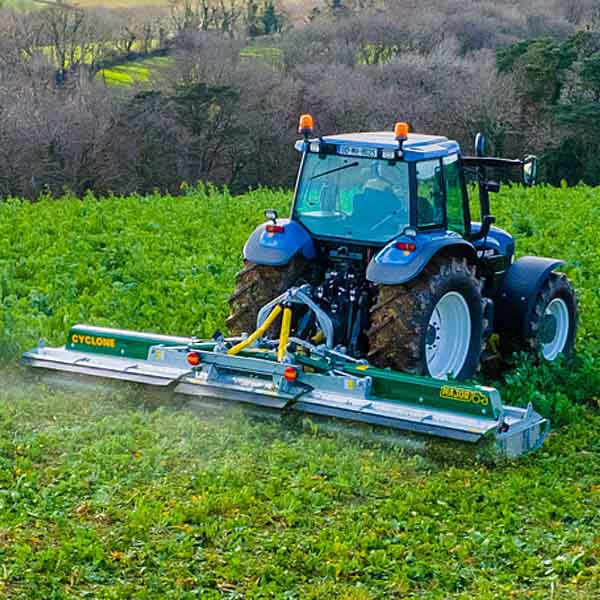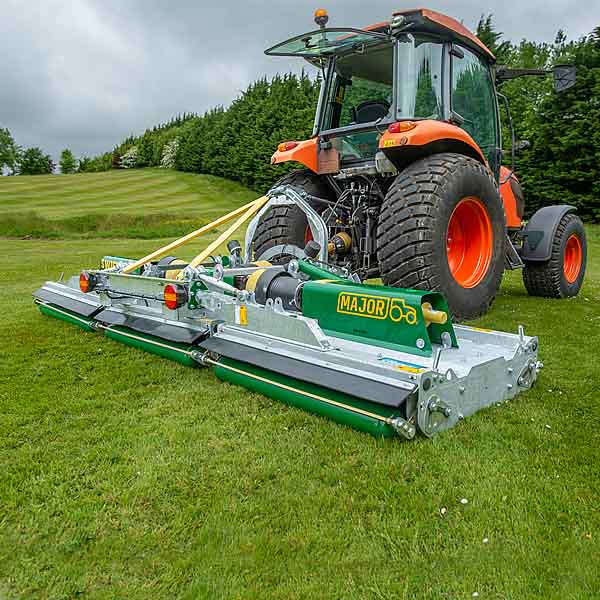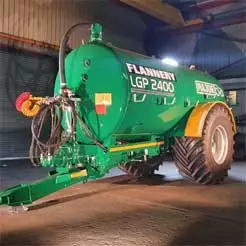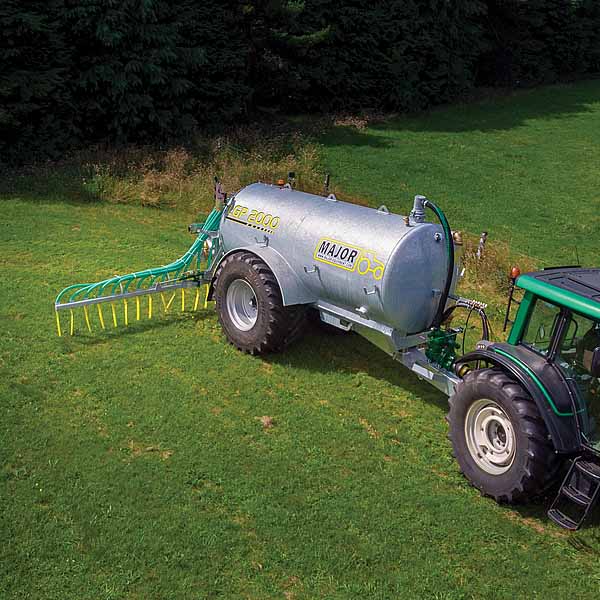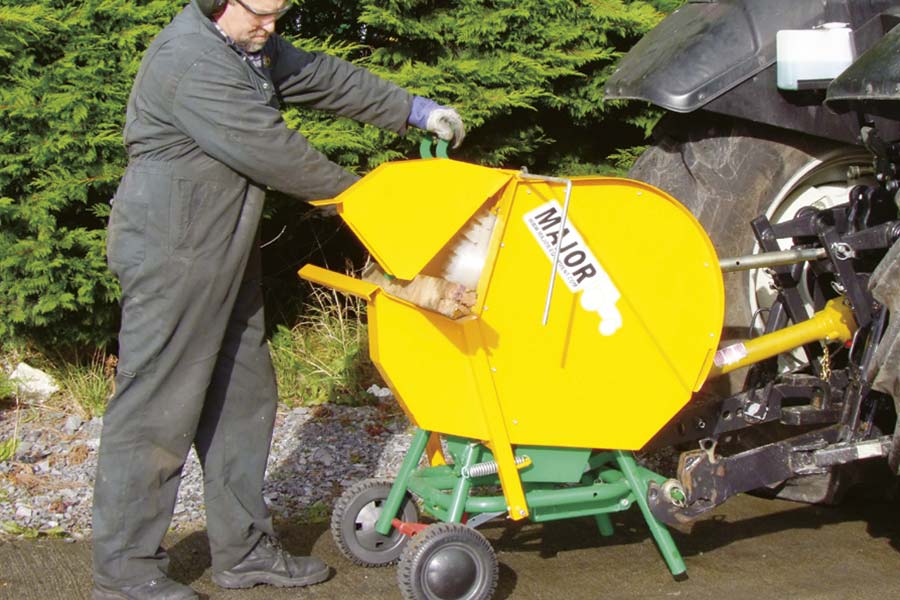These farmers use cover crops and crop rotation to build soil fertility on their lands. The Major Cyclone plays a crucial part in improving output, field performance and overall efficiencies so the families can remain on the farm.
Soil is the basis of food production. Healthy soil is capable of producing high quality, nutrient dense foods and maintaining natural ecosystems to ensure our survival.
Intensive farming practises can deplete the soil of nutrients. Soil compaction from heavy machinery reduces the quantity and diversity in the soil composition and negatively impact soil fertility. Fertilisers provide a short-term solution, but there is the risk of contaminating water supplies and creating an imbalance in the ecosystem.
Enter cover crops, crop rotation and other regenerative agriculture practices to revitalise the soil and the environment. We hear from three farming enterprises applying various cropping practices to maintain soil health in their operations.
Farming to Red Tractor and Soil Association standards
Home Farm Nacton near Ipswich supplies produce to major supermarket chains throughout UK. Over thirty different types of crops are farmed on 4,800-acres of land along the Orwell Estuary, with some 10 percent of the acreage under Soil Association organic certification. The business grows under the Red Tractor Assured Food Standard and many ‘quality’ food standards set by premier supermarkets.
“Because our land in general is so light, we can pretty much work it every day of the year,” says farm manager Andrew Williams. “We will often double-crop to maximise field performance, an example planting and harvesting vining peas during March to July followed by cauliflowers for the autumn and winter.”
Maintaining soil health ensures the land remains productive throughout the year. “We grow lots of cover crops,” Andrew explains. “By retaining a high level of organic matter in our soils we are able to maximise yield while ensuring a healthy growing medium for now and into the future.”
The team uses a 5.6m front-mounted Major Cyclone to recycle crop residue and green manure. “The finish from the Cyclone encourages a faster regrowth,” continues Andrew. “We use the Cyclone for other maintenance applications throughout the farm from general field and woodland management to field corners and margins – it really is a versatile and trouble-free machine,” Andrew exclaims.
“It’s a highly usable piece of machinery that helps us maintain our goal of farming to the highest professional standard, maximising yields whilst maintaining, developing and enhancing the environment we operate in,” Andrew concludes.
Relying on cover crops to protect soil erosion and the family business
Gordon Sullivan is the fourth generation farming mixed tillage crops outside Kinsale, Co Cork. Without farm stock, cover crops are an essential part to maintain healthy soils in this entirely arable operation.
“We don’t have stock on our farm or have re-usable farmyard manures, therefore cover crops are our best solution,” says Gordon. “By growing cover crops, we can recycle nutrients, increase the soil organic matter, as well as protect our soils from erosion. Fields that have cover crops have shown very little erosion, if any, even in areas that tend to lay wet.”
“In our business environment we have to find ways to reduce our operating costs and maximise our production performance, so we looked at ways to improve mulching efficiency and speed up the entire mulching process,” Gordon explains.
They purchased the 5.6m Major Cyclone to replace an older flail mower that was hard on the tractor, expensive to maintain, and very poor at daily output. “The Major Cyclone is twice the width of the previous mower, uses 25% less fuel, and covers the ground much faster,” exclaims Gordon. “We get anything between seven and ten acres per hour, and it has a much lower capital outlay!”
“The Cyclone is fully mounted and is easy to operate,” continued Gordon. “By adjusting the full-width rear roller, we can control the level of mulching we require according to the vegetation we are processing.”
“The mulched cover crop or crop residues are completely chopped and disappear easily into the remaining cultivated soil tilth,” enthused Gordon. “The mulched green manure increases the organic matter in the soil, which has a direct and positive effect on yields.”
“The Major Cyclone is one of the best investments we’ve made to help our family farm maintain a level of profitability that will see the next up-and-coming generation support and continue to grow our family business,” concluded Gordon.
“The Major Cyclone is twice the width of our previous flail, uses 25 percent less fuel, and covers the ground much faster.”
A weapon for East Anglia agricultural contractor
Performance, reliability and safety are important factors for agricultural contractor and NFU Cereals Board member Jamie Burrows. Alongside his family’s 160-acre Sandridgebury Farm, he works on c1000ha of mainly arable ground around St. Albans in Hertfordshire. He also is contracted to maintain the open spaces and wildflower meadows at Heartwood Forest under the Woodland Trust, so his machinery needs to be first-rate.
“We use the 4.2m Cyclone at Heartwood Forest for maintaining the trails and pathways and it leaves an excellent finish,” enthuses Jamie. “We also have our own livery and riding school and it’s used here to maintain a highly professional appearance. Even with the undulating grounds in the parklands, we don’t get any scalping.”
“Compared to flail mowers, the Major Cyclone is very competitively priced, uses much less fuel and leaves an excellent striped presentation,” added Jamie. “The Cyclone leaves such a good finish, this is already pleasing our customers.”
One customer is an organic cereal farmer who plants cover crops to improve soil fertility in crop rotation. The mulching blade system on the Cyclone ensures all the clover cover crop residue decomposes quickly back into the soil so the subsequent cereal crop can be planted in time.
“I’m very pleased with how the machine is working,” continues Jamie. “The maintenance is so simple, there’s hardly anything we need to do other than a bit of regular greasing. Our operators like using it because it’s solid, reliable and a great bit of kit.”
“I know I have made the right choice with the Major Cyclone and it’s already proven itself in the field,” concludes Jamie.

